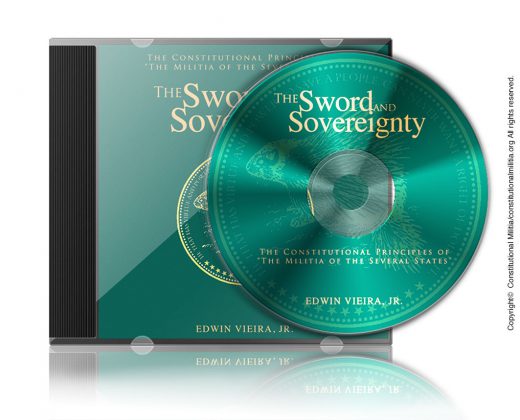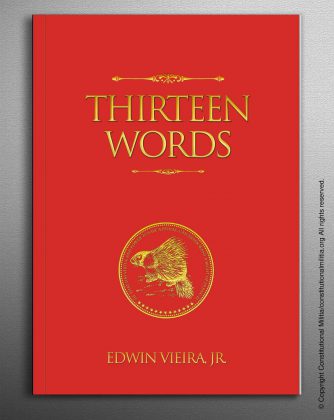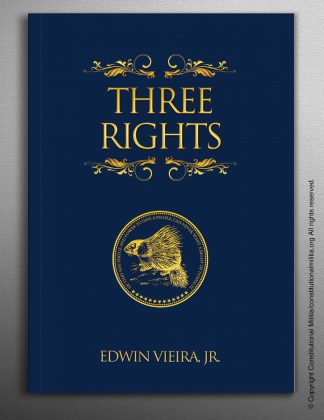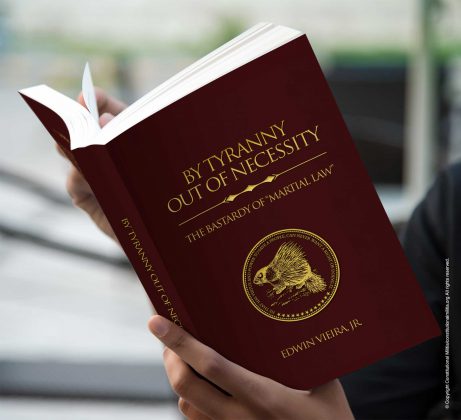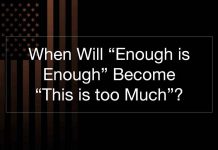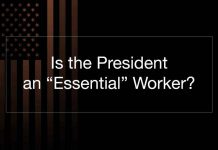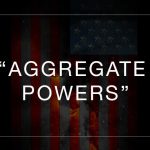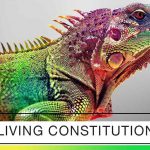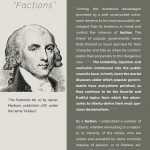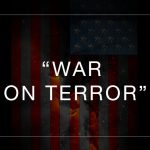Last Updated on January 18, 2021 by Constitutional Militia
Anyone who pays attention to contemporary debates and discussions among this country’s “constitutionalists” and “patriots” about the meaning of the Second Amendment soon comes upon the contention that the phrase “[a] well regulated Militia” does not refer to “regulation” by government. Instead, it supposedly means that the individuals who form a “militia” on their own are themselves to put it into proper order, in terms of organization, equipment, training, and discipline suitable for the purposes of a “militia” as they understand those purposes—without any control, direction, influence, assistance, or other participation by public officials.
A. Now, the effect of this theory on the goal of the Second Amendment—“the security of a free State”—indicates that more is involved in the theory’s promulgation than mere industrial-strength ignorance on the part of its proponents. Nonetheless, that ignorance should be exposed and examined.
1. The notion that the phrase “[a] well regulated Militia” does not refer to “regulation” by government abstracts from the context in which the phrase appears. That phrase is not some generality without a concrete legal position and historical foundation. Rather, it is specific to the Second Amendment.
The Second Amendment itself is not some detached and airy generality, either, but instead is an Amendment of the original Constitution. Therefore the meaning of the phrase “[a] well regulated Militia” must be tied to, informed by, and applied in consistency with the original Constitution. And the original Constitution plainly refutes the argument that “[a] well regulated Militia” has no connection to government with respect to the source of the needed “regulation”.
First, the original Constitution refers to “the Militia of the several States”, not “the Militia in the several States”. This is because the Militia which existed at the time of ratification of the Constitution, and for many decades prior thereto in the Colonies and then the independent States, were Colonial and State governmental institutions, not private establishments. Self-evidently, the Militia—howsoever they may have been “regulated” as a matter of fact—were “regulated” as a matter of law by government, not by private individuals, because they were integral parts of the governments in all of the States and Colonies, not mere private associations. Because the original Constitution intends these institutions to continue as permanent parts of its federal system—an intention which the Second Amendment does not negate, challenge, or question—“the Militia of the several States” today are, in terms of their governmental character, the same as “the Militia of the several States” in the late 1700s. So the “regulation” of “the Militia of the several States” today must be just as governmental in nature as was the “regulation” of “the Militia of the several States”, and of the Colonies which preceded them, throughout the 1700s and much of the 1600s. Certainly no basis exists for contending that each of “the Militia of the several States” at the time of ratification of the Constitution (1788) was ever considered by anyone—with respect to any of its characteristics, including its governmental nature—to be other than “[a] well regulated Militia” as the Second Amendment was understood at the time of its ratification (1791).
Second, the original Constitution delegates to Congress the powers “[t]o provide for calling forth the Militia to execute the Laws of the Union, suppress Insurrections and repel Invasions”; “[t]o provide for organizing, arming, and disciplining, the Militia”; and “[t]o provide * * * for governing such Part of the[ Militia] as may be employed in the Service of the United States”. Self-evidently, these are powers of “regulation”. Combining the Second Amendment with the original Constitution compels the conclusion that “[a] well regulated Militia” is one which Congress “regulates” in the foregoing manner for the foregoing purposes. Congress, of course, is the body within the General Government in which the original Constitution “vest[s]” “[a]ll [of the] legislative Powers” it grants. Therefore, Congress’s exercise of its powers related to the Militia constitutes obviously and inescapably governmental “regulation” of the Militia.
Third, the original Constitution confers on the President of the United States the position of “Commander in Chief * * * of the Militia of the several States, when called into the actual Service of the United States”. Obviously, the President’s capability in law of giving commands to the Militia constitutes an important form of “regulation”. Combining the Second Amendment with the original Constitution compels the conclusion that “[a] well regulated Militia” is one of which the President is the “Commander in Chief” under certain circumstances. The President is the highest executive officer of the General Government. Therefore, his position as “Commander in Chief” constitutes yet another element of obviously and inescapably governmental “regulation” of the Militia.
2. For additional proof, one can go back in American legal history a step farther, to the Articles of Confederation. They provided that “every state shall always keep up a well regulated and disciplined militia, sufficiently armed and accoutred”. “[E]very state”, not private individuals. And if the Militia were to be “well regulated and disciplined” through the actions of the States— which, of course, were then (as they are now) quintessentially governmental institutions—then such “regulation” and “discipline” could have been nothing less than governmental in origin, character, and effect.
3. For another measure of compelling evidence, those who still remain skeptical can consult the entire pre-constitutional history of the Militia in the Colonies and the independent States. My book The Sword and Sovereignty (available as a CD-ROM at amazon.com) elucidates the legal history of the Militia by focusing on two representative Colonies and then independent States—Rhode Island and Virginia. If such a short book—of only 2,250 pages, with a mere 4,445 footnotes and 2,174 endnotes which refer to original sources—is less than convincing, one can consult the multi-volume set put out by the Selective Service System, Backgrounds of Selective Service, Military Obligation: The American Tradition, A Compilation of the Enactments of Compulsion From the Earliest Settlements of the Original Thirteen Colonies in 1607 Through the Articles of Confederation in 1789, Special Monograph No. 1, Volume II (14 Parts) (Washington, D.C.: Government Printing Office, 1947). The latter compendium reproduces a great mass of charters, ordinances, acts, and statutes relating to the Militia in all of the thirteen Colonies and then independent States during the entire pre-constitutional era. The gist of both of these studies—and especially of mine, which delves into the subject in far more painstaking detail than does the Selective Service’s compilation—is that the Militia in this country were always the products of charters, ordinances, acts, and statutes—and, as such, they were both created and “regulated” by governments in, and formed parts of the governments of, the Colonies and States. They were not in any way, shape, or form mere private associations which individuals cobbled together and then “regulated” on their own, independent of government.
4. And, of course, if one goes forward in time to the post-constitutional period he can find the very same pattern of “regulating” the Militia by means of statutes passed by Congress pursuant to the Constitution and by the States’ legislatures pursuant to their constitutions.
B. The evidence on this score being overwhelming, one must marvel how anyone who calls himself a “constitutionalist” or a “patriot” (or who, whatever he calls himself, is even a kindergarten student of American law and history) can possibly deny it with a straight face. Or, perhaps more to the point, why anyone wants to deny it. Or, as is generally the case, why anyone pretends that the evidence does not exist, by saying nothing at all about it.
1. In some instances, of course, ignorance coupled with sloth provides a sufficient explanation. Unfortunately, the ranks of self-styled “constitutionalists” and “patriots” these days are filled to overflowing with people whose heads are stuffed with glittering ideas and glib phrases which they have picked up second-hand, but the demerits and other limitations of which they have never bothered to investigate for themselves. Had they performed the requisite research, they would know that “[a] well regulated Militia” must be “regulated” by government, because every such Militia is and must be a governmental establishment in its own right, as has been the case throughout American history. They do not know this—and do not care that they do not know it—because to appear as “experts” by pouring out gibberish across the Internet for consumption by an uniformed and gullible public is far easier than pouring over history books for their own edification.
2. In other cases, intellectual arrogance coupled with self-interest is a plausible explanation. Of all contemporary “constitutionalists” and “patriots”, ultra-libertarians in particular are driven by a philosophical idée fixe— namely, that government rests upon compulsion of individuals, that compulsion of individuals (especially themselves) is almost always bad, and therefore that government’s involvement in any aspect of human life (especially as it relates to them) should usually be opposed. Naturally, they inject this prejudice into their misreading of the Constitution. In place of the true Militia—participation in which is compulsory for every able-bodied adult in the community, pursuant to governmental “regulation”—they substitute mythical “private militia”, participation in which is entirely voluntary, pursuant to “regulation” by the members themselves. And they refuse to consider any evidence—no matter how obviously relevant—that calls this fantasy into question.
3. I suspect, however, that the most significant impetus behind the notion that the phrase “[a] well regulated Militia” does not refer to “regulation” by government emanates from a source far more sinister and dangerous than mere ignorance or selfishness. In this situation one must ask, cui bono? Who will benefit most if those common Americans who pay attention to the Second Amendment come to believe in that fallacy? Certainly not those Americans, or any others for that matter.
As I have documented and explained in my books The Sword and Sovereignty, Thirteen Words, Three Rights, and most recently By Tyranny Out of Necessity: The Bastardy of “Martial Law”, the Militia are the key institutions through which WE THE PEOPLE can protect and exercise popular sovereignty through popular self-government. The Militia are the most important institutions of government, because in a republic founded upon the principles of popular sovereignty and popular self-government THE PEOPLE must enjoy both the legal authority and the institutional capability to assume direct control of the governmental apparatus whenever the circumstances warrant such action, and to defend their government from all threats, foreign and domestic, with whatever degree of force may be required. If, however, one accepts the notion that the Militia are not part and parcel of government—but that there exists an unbridgeable separation, even an inevitable antagonism, between the Militia and government—then, because the Militia are composed of the body of THE PEOPLE, one must also infer that there exists no less of a separation and an antagonism between THE PEOPLE and government. Inherent in that conclusion is a denial of popular sovereignty and popular self-government altogether. WE THE PEOPLE are no longer themselves the ultimate authorities in and over government which they administer by themselves, but are reduced to merely the abject subjects of government which is administered by someone else.
Now who stands to gain from having the latter, false relationship between THE PEOPLE and government gain credibility in this country? Certainly not THE PEOPLE in general. Certainly not any reader of this commentary in particular. Those who intend to profit from this deception are the Forces of Darkness who lurk behind such agencies as the Department of Homeland Security and such subversive private organizations as a certain notorious and obnoxious “poverty” law center. The very last thing these aspiring tyrants and miscreants want is for any common American to understand that the Militia always were, still are, and must be governmental institutions—indeed, the most important and most powerful of the institutions of popular sovereignty and popular self-government. So first and foremost the Forces of Darkness need to deceive those common Americans who do pay attention to the Second Amendment into believing that the Militia are not governmental establishments at all: that “[a] well regulated Militia” has nothing to do with government.
By channeling those Americans who do become interested in the concept of the Militia into the blind alley of “private militia”—that is, faux “militia” which are not “well regulated” in the one-and-only constitutional sense of that term, and therefore can lay no claim whatsoever to governmental authority—the Forces of Darkness can demonize those Americans as “anti- government” extremists, even as “domestic terrorists”, and target them for harassment, and ultimately elimination, by “law enforcement agencies” acting in the name of government against the supposed enemies of government. In this way, the Forces of Darkness can gain three objectives:
(1) They can impede revitalization of the true constitutional Militia, because next to no “constitutionalists” and “patriots” will come to realize what actually needs to be done to revitalize those institutions, and therefore will take no action along the proper lines.
(2) The Forces of Darkness can render utterly ineffective everything that “constitutionalists” and “patriots” try to do with “private militia”. For “private militia” can wield no governmental authority, and therefore are useless for the purpose of asserting popular sovereignty under the political conditions which prevail today. Thus, every precious moment of time and invaluable ounce of resources spent on “private militia” are wasted—and, of course, having been flushed away can never be redirected towards revitalizing the constitutional Militia.
(3) By thus frustrating revitalization of the constitutional Militia, the Forces of Darkness can make unobtainable for common Americans “the security of a free State”. And the “unfree State” which results will then be permanently under their control, because WE THE PEOPLE will have no means to throw off its tyranny.
Worst of all is that the Forces of Darkness are achieving these goals on the cheap, because “constitutionalists” and “patriots” are—perhaps unthinkingly, but nonetheless effectively—doing their subversive work for them. How the Forces of Darkness must be belly laughing while “constitutionalists” and “patriots” disarm themselves and every other American of the most important weapon WE THE PEOPLE can wield through the Militia: namely, governmental authority—and not just governmental authority in general, but supreme constitutional authority in particular.
To be sure, no reader of this commentary is compelled to subscribe to any of this. As the Supreme Court affirmed in Cantwell v. Connecticut, in America freedom of belief is absolute, no matter how childishly ridiculous one’s beliefs may be. But, as Richard Weaver once astutely pointed out, “ideas have consequences”. And bad ideas tend to beget catastrophes. The notion that the phrase “[a] well regulated Militia” does not refer to “regulation” by government is an egregiously bad—indeed, an anti-constitutional and a really, really stupid—idea. It is incompatible with, and directly threatens, the survival of popular sovereignty and popular self-government in this country.
After all, for a republic based upon the principle of popular self-government to survive, THE PEOPLE themselves must participate directly and decisively in government, not sit on the political sidelines as idle spectators while others govern in their stead and to their detriment. THE PEOPLE themselves must take up key positions inside the governmental system, with legal authority over the system, in order to control the system—and then must exercise whatever measure of control the circumstances may warrant. The Constitution itself declares in unequivocal terms that the key positions in the federal system it created are to be held by the Militia: “A well regulated Militia, being necessary to the security of a free State”. Not optional, but necessary. Necessary. Only by having “well regulated Militia” in every State, “regulated” by government according to constitutional principles so that the Militia are the integral and puissant components of government which the Constitution intends them to be, will WE THE PEOPLE themselves be able to employ the Militia to regulate government as government should be regulated in strict compliance with popular sovereignty throughout the federal system.
But perhaps, along with many self-styled “constitutionalists” and “patriots”, some readers of this commentary imagine that they know better than the Founders of this country. Perhaps they imagine that “[a] well regulated Militia” is not “necessary to the security of a free State”. Perhaps they imagine that “private militia” can be “well regulated” according to principles diametrically opposed to those that Americans applied to the Militia from the earliest Colonial days. Perhaps they imagine even that, notwithstanding a lack of constitutional authority, “private militia” can protect “a free State” (even though “private militia” can exist only in, and require protection by, “a free State”).
If so, those readers simply need to wait until events compel imagination to give way to reality—until the governmental machinery which has nothing to do with “regulating” “well regulated Militia”, because “well regulated Militia” do not exist in those readers’ communities as parts of their governments, gets around to imposing “martial law” on them where they live. For that day is likely to dawn much sooner than they may imagine, because “constitutionalists” and “patriots” are recklessly squandering the little time Americans have left in which to revitalize “well regulated Militia” in the way the Militia should be “regulated”. On that day, those readers may finally appreciate the wisdom embodied in the old aphorism: “Experience keeps a hard school; but fools will learn in no other.” Unfortunately, at that point their enlightenment will have come too late.
©2014 Edwin Vieira, Jr. – All Rights Reserved.





























